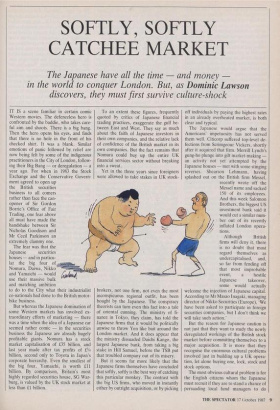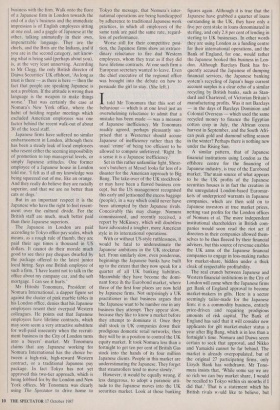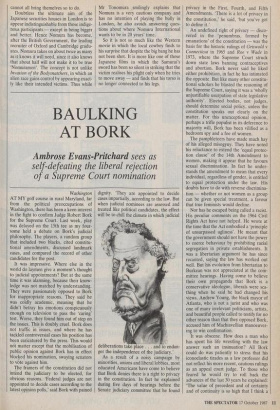SOFTLY, SOFTLY CATCHEE MARKET
The Japanese have all the time — and money
in the world to conquer London. But, as Dominic Lawson
discovers, they must first survive culture-shock
IT IS a scene familiar in certain comic Western movies. The defenceless hero is confronted by the baddie, who takes care- ful aim and shoots. There is a big bang. Then the hero opens his eyes, and finds that there is no hole in the front of his checked shirt. It was a blank. Similar emotions of panic followed by relief are now being felt by some of the indigenous practitioners in the City of London, follow- ing their Big Bang — or deregulation — a year ago. For when in 1983 the Stock Exchange and the Conservative Govern- ment agreed to open up the British securities business to all corners rather than face the can- opener of Sir Gordon Borrie's Office of Fair Trading, one fear above all must have made the handshake between Sir Nicholas Goodison and Mr Cecil Parkinson an extremely clammy one.
The fear was that the But whereas the Japanese domination of some Western markets has involved ex- traordinary efforts of marketing — there was a time when the idea of a Japanese car seemed rather comic — in the securities business the Japanese are already hugely profitable giants. Nomura has a stock market capitalisation of £35 billion, and last year made after tax profits of f3/4 billion, second only to Toyota in Japan's corporate hierarchy. Even the smallest of the big four, Yamaichi, is worth £11 billion. By comparison, Britain's most highly regarded securities house, SG War- burg, is valued by the UK stock market at less than £1 billion. To an extent these figures, frequently quoted by critics of Japanese financial trading practices, exaggerate the gulf be- tween East and West. They say as much about the faith of Japanese investors in their own companies, and the relative lack of confidence of the British market in its own companies. But the fact remains that Nomura could buy up the entire UK financial services sector without breaking into a sweat.
Yet in the three years since foreigners were allowed to take stakes in UK stock- brokers, not one firm, not even the most inconspicuous regional outfit, has been bought by the Japanese. The conspiracy theorists can turn even this fact into a tale of oriental cunning. The ministry of fi- nance in Tokyo, they claim, has told the Japanese firms that it would be politically unwise to throw Yen like bait around the London market. And it does appear that the ministry dissuaded Daichi Kango, the largest Japanese bank, from taking a big stake in Hill Samuel, before the TSB put that troubled company out of its misery.
But it seems far more likely that the Japanese firms themselves have concluded that softly, softly is the best way of catching this particular monkey. The contrast with the big US firms, who moved in instantly either by outright acquisition, or by picking off individuals by paying the highest rates in an already overheated market, is both clear and typical.
The Japanese would argue that the Americans' impetuosity has not served them well. Citicorp suffered top-level de- fections from Scrimgeour Vickers, shortly after it acquired that firm. Merrill Lynch's gung-ho plunge into gilt market-making — an activity not yet attempted by the Japanese houses — met with some stinging reverses. Shearson Lehmann, having splashed out on the British firm Messel, recently wrote off the Messel name and sacked 150 of its employees. And this week Salomon Brothers, the biggest US investment bank said it would cut a similar num-
./ber out of its recently inflated London opera- tions. Although British
firms will deny it, there is no doubt that most regard themselves as undercapitalised, and, so far from fending off that most improbable event, a hostile Japanese takeover, some would actually welcome the injection of Japanese capital. According to Mr Masao Inagaki, managing director of Nikko Securities (Europe), 'We have been asked to participate in foreign securities companies, but I don't think we will take such action.'
But the reason for Japanese caution is not just that they want to study the newly deregulated workings of the British stock market before committing themselves to a major acquisition. It is more that -they recognise the enormous cultural problems involved just in building up a UK opera- tion, let alone buying one, lock, stock and stock options.
The most obvious cultural problem is for the English citizens whom the Japanese must recruit if they are to stand a chance of persuading local fund managers to do business with the firm. Walk onto the floor of a Japanese firm in London towards the end of a day's business and the immediate impression is of English employees sitting at one end, and a gaggle of Japanese at the other, talking animatedly in their own, impenetrable language. They are the chiefs, and the Brits are the Indians, and if you are in the second category, not know- ing what is being said (perhaps about you), is, at the very least unnerving. According to Mr Clegg, the only British director of Daiwa Securities' UK offshoot, 'As long as trust is there — as there is here — then the fact that people are speaking Japanese is not a problem. If the attitude is wrong then language is the weapon to make things worse.' That was certainly the case at Nomura's New York office, where the habit of holding regular meetings which excluded American employees was one factor behind the recent walk-out of about 30 of the local staff.
Japanese firms have suffered no similar embarrassment in London, although there has been a steady leak of local employees who resent either the seeming impossibility of promotion to top managerial levels, or simply Japanese attitudes. One former employee of a Japanese house in London told me, felt as if all my knowledge was being squeezed out of me, like an orange. And they really do believe they are racially superior, and that we are no better than cats or dogs.'
But in an important respect it is the Japanese who have the right to feel resent- ment over the cultural divide. For the British staff are much, much better paid than their Japanese superiors.
The Japanese in London are paid according to Tokyo office pay scales, which means, as a rough rule of thumb, they are paid their age times a thousand in US dollars. It cannot do their morale much good to see their pay cheques dwarfed by the package offered to the latest junior local hiring. Says one British employee of such a firm, 'I have learnt not to talk in the office about my company car, and the soft mortgage. I can see it hurts.'
Mr Hitoshi Tonomura, President of Nomura International, a dapper figure set against the cluster of pink marble tables in his London office, denies that his Japanese employees resent their overpaid Western colleagues. He points out that Japanese employees have lifetime contracts, which may soon seem a very attractive substitute for well-paid insecurity when the recruit- ment business in the City of London turns into a buyers' market. Mr Tonomura claims that any ,Japanese working for Nomura International has the choice be- tween a high-risk, high-reward Western contract, or a traditional Japanese pay package. In fact Tokyo has not yet approved this two-tier approach, which is being lobbied for by the London and New York offices. Mr Tonomura was clearly using The Spectator to drive home to Tokyo the message, that Nomura's inter- national operations are being handicapped by adherence to traditional Japanese work practices, in which all employees of the same rank are paid the same rate, regard- less of performance.
Worse still for their competitive posi- tion, the Japanese firms show an extraor- dinary reluctance to fire dud Western employees, whom they treat as if they did have lifetime contracts. At one such firm a European secretary wanted to leave. Even the chief executive of the regional office was brought into the debate on how to persuade the girl to stay. (She left.) Itold Mr Tonomura that this sort of behaviour — which is at one level just an overwhelming reluctance to admit that a mistake has been made — was a measure of Japanese inefficiency. Mr Tonomura readily agreed, perhaps pleasantly sur- prised that a Westerner should accuse Japanese of inefficiency rather than the usual 'crime' of being too efficient to be allowed to compete unfettered. 'Right. In a sense it is a Japanese inefficiency.'
Set in this rather unfamiliar light, Shear- son's butchery at Messel looks far less of a disaster for the American approach to Big Bang. The take-over of the UK stockbrok- er may have been a flawed business con- cept, but the US management recognised this early and jettisoned the excess baggage (people), in a way which could never have been attempted by their Japanese rivals. Conceivably this may change. Nomura commissioned, and recently received, a report by McKinsey, which will doubtless have advocated a tougher, more American style in its international operations.
With or without US-style ruthlessness, it would be fatal to underestimate the Japanese ambitions in the UK stockmar- ket. From similarly slow, even ponderous, beginnings the Japanese banks have built up to the extent that they now speak for a quarter of all UK banking liabilities. Meanwhile they have become the domi- nant force ih the Eurobond market, where three of the first four places are now held by Japanese firms. Not surprisingly a UK practitioner in that business argues that 'the Japanese want to be number one in any business they attempt. They appear slow, because they like to know a market before they attempt to dominate it. Once they shift stock in UK companies down their prodigious domestic retail networks, then they will be in a position to control the UK equity market. It took Nomura less than a fortnight to get ten per cent of British Gas stock into the hands of its four million Japanese clients. People in this market are underestimating the Japanese. They forget that steamrollers tend to move slowly.'
However, it would be equally wrong, if less dangerous, to adopt a paranoic atti- tude to the Japanese moves into the UK securities market. Look at those banking figures again. Although it is true that the Japanese have grabbed a quarter of loans outstanding in the UK, they have only a five per cent stake in loans denominated in sterling, and only 2.8 per cent of lending in sterling to UK businesses. In other words they are using London as a funding centre for their international operations, and the Bank of England, for one, would rather the Japanese booked this business in Lon- don. Although Barclays Bank has fre- quently accused the Japanese of dumping financial services, the Japanese banking system's recycling of Japan's huge current account surplus is a clear echo of a similar recycling by British banks, such as Stan- dard and Chartered, of Victorian Britain's manufacturing profits. Was it not Barclays — in the days of Barclays Dominion and Colonial Overseas — which used the same recycled money to finance the Egyptian cotton crop in July, the African cocoa harvest in September, and the South Afri- can peak gold and diamond selling season in the winter? Perhaps there is nothing new under the Rising Sun.
A similar pattern, that of Japanese financial institutions using London as the offshore centre for the financing of Japanese industry, is true of the Eurobond market. The main source of what appears to be the UK profits of the Japanese securities houses is in fact the creation in the unregulated London-based Euromar- kets of underpriced warrants in Japanese companies, which are then sold on to Japanese investors at true market prices, netting vast profits for the London offices of Nomura et al. The more independent institutional shareholders in British com- panies would soon read the riot act if directors in their companies allowed them- selves to be thus fleeced by their financial advisers, but this source of revenue enables the UK arms of the Japanese financial companies to engage in loss-making rushes for market-share, hidden under a thick cloak of respectable profitability.
The real crunch between Japanese and Western financial institutions in the City of London will come when the Japanese firms get Bank of England approval to become market-makers in gilts. Here is a sector seemingly tailor-made for the Japanese firm: it is a commodity business, entirely price-driven and requiring prodigious amounts of risk capital. The Bank of England has said that it will consider new applicants for gilt market-maker status a year after Big Bang, which is in less than a fortnight's time. Nomura and Daiwa seem certain to seek that approval, and Nikko and Yamaichi cannot be far behind. The market is already overpopulated, but of the original 27 participating firms, only Lloyds Bank has withdrawn. Mr Tono- mura insists that, 'While some say we are so rich we can buy market share, I would be recalled to Tokyo within six months if I did that.' That is a statement which his British rivals would like to believe, but cannot all bring themelves so to do.
Doubtless the ultimate aim of the Japanese securities houses in London is to appear indistinguishable from those indige- nous participants — except in being bigger and better. Hence Nomura has become, after the British Government, the leading recruiter of Oxford and Cambridge gradu- ates. Nomura takes on about twice as many as it knows it will need, since it also knows that about half will not make it to be true `Nomuramen'. The concept is not unlike Invasion of the Bodysnatchers, in which an alien race gains control by appearing exact- ly like their intended victims. Thus while Mr Tonomura smilingly explains that Nomura is a very cautious company and has no intention of playing the bully in London, he also avoids answering ques- tions about where Nomura International wants to be in 20 years' time.
So it is not so much like the Western movie in which the local cowboy finds to his surprise that despite the big bang he has not been shot. It is more like one of those Japanese films in which the Samurai's sword has been so silent in striking that the victim realises his plight only when he tries to move away — and finds that his torso is no longer connected to his legs.




























































 Previous page
Previous page